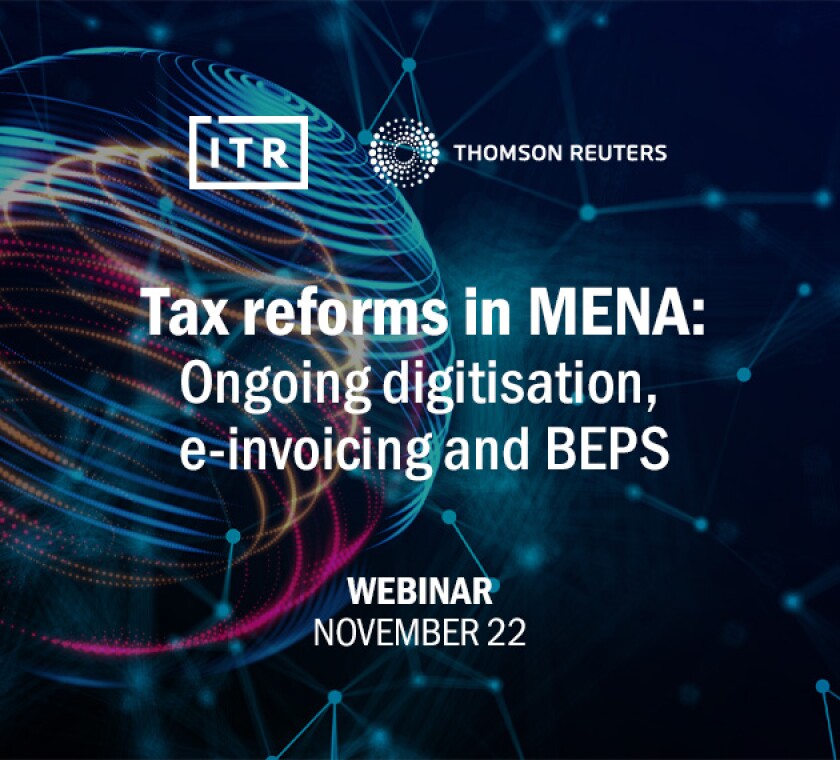Watch ITR’s webinar on tax reforms in the Middle East and North Africa (MENA) region, including ongoing digitisation, e-invoicing and BEPS
In association with Thomson Reuters, the live webinar took place on November 22 at 10am GMT / 2pm GST.
In this webinar, the panel discussed the latest tax trends in the MENA region.
Tax transformation and the role of modern tax technology
In the MENA region and globally, technology has a growing role in tax compliance.
According to PwC’s 2021 Middle East Tax Leaders Survey, 63% of organisations say digital enablement is a strategic priority for the next one to three years, half plan to be automated within two years, and a further 40% say they will be automated within five years.
Upcoming e-invoicing regime developments in the GCC
Many of the region’s tax authorities are ahead of the digitisation curve, already using electronic payments and online portals. The next step is e-invoicing. The panel of experts look at upcoming e-invoicing regime developments in Saudi Arabia and Egypt, and discuss how organisations can make sure they have the technology capabilities to stay compliant.
In May 2021, the Zakat, Tax and Customs Authority published guidelines and standards, making it mandatory for all eligible taxable persons to develop the capabilities to generate and store electronic invoices. Phase one of the e-invoicing implementation will be in force from December 4 2021. In Egypt, the mandatory e-invoicing regime is already underway. As of January 2022, VAT will no longer be deductible from paper invoices.
New tax regulations, including impact of BEPS 2.0 on the Middle East
Following on from the original OECD BEPS package to tackle profit shifting and tax avoidance, the OECD and the G20 Inclusive Framework have introduced a new initiative – known as BEPS 2.0 – to address tax challenges arising from digitalisation. This comprises two pillars:
Pillar one aims to ensure a fairer distribution of profits and taxing rights with respect to the largest MNEs, by re-allocating some taxing rights over MNEs to markets where they have business activities and earn profits, no matter whether firms have a physical presence there; and
Pillar two introduces a global minimum effective tax rate of 15%, to put a floor on competition over corporate income tax.
The webinar explored the potential impact that pillar one and pillar two could have on KSA, UAE, Bahrain, Oman and other countries in the Middle East that are members of the Inclusive Framework.
The 60-minute webinar was moderated by Hari Ganesh Kumar of Thomson Reuters, and facilitated by ITR. The webinar was followed by a Q&A session.
Prepare for the future: Discover what steps your business can take today. Watch the webinar now.

Hari Ganesh Kumar
Enterprise proposition lead, ONESOURCE, Asia and emerging markets
Thomson Reuters
Hari Ganesh Kumarleads Thomson Reuters ONESOURCE technology propositions across Asia-Pacific, India, MENA and Africa.
As enterprise proposition lead, Hari works with large organisations propelling their adoption of technology to meet their global tax and accounting compliance and reporting requirements.
In addition to driving engagement and ensuring customers get the most out of the ONESOURCE suite and services, Hari’s goal is to grow the ONESOURCE business across the region.

Thomas Vanhee
Partner
Aurifer Middle East Tax Consultancy
Thomas Vanhee is a partner at Aurifer Middle East Tax Consultancy and affiliate professor of tax law.
Thomas founded Aurifer, a boutique tax firm established in Dubai, after a decade of working at tier 1 tax law firms in Brussels and Paris, and after having been seconded with Deloitte in the Gulf. He has been involved in several high-profile deals and worked for blue chip and quoted companies and institutions in various sectors. He has also been heavily involved in tax policy in Europe and the Gulf. Recently, he has been assisting businesses in assessing their readiness for the introduction of VAT on January 1 2018.
Thomas teaches VAT at Paris Sorbonne Abu Dhabi in the first tax LLM of its kind in the Gulf. He also joined his former university (Solvay Brussels School of Economics and Management) to teach an introductory course on tax law to master students.

Saad Demehati
Engagement Manager
Oliver Wyman
During his career, Saad Demehati focused on strategy and large implementation programmes for public and private entities in Europe and the MENA region.
Saad has extensive experience working with Ministries, Tax and Customs Authorities on their large-scale tax, customs and e-invoicing programmes, including strategy, digitisation and national roll-outs.
Prior to Oliver Wyman, Saad was a quantitative analyst in Société Générale Bank in Paris.

Syed Jafri
Partner
Oliver Wyman
Syed Jafri has extensive experience working with Finance Ministries on their fiscal programmes, including supporting end to end buildup of tax authorities, launch of indirect taxes and design and deployment of sophisticated tax fraud prevention programmes.















